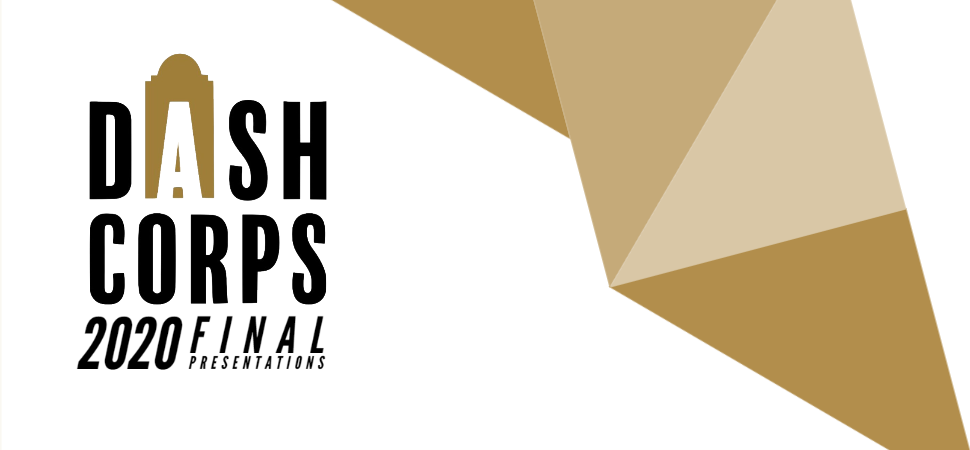Dash Corps Student Groups Present Final Projects
At the start of the academic year, 22 Wake Forest undergraduate students were paired with various local non-profit and civic organizations for a year-long, practical exposure to community development. Lessons in nonprofit management and social identity during the fall semester evolved into capacity-building projects for each of the selected community organizations, including ABC of NC, the Down Syndrome Association of Greater Winston-Salem, Neighbors for Better Neighborhoods, Samaritan Ministries, and WS Mixxer.
Dash Corps — a leadership and civic action program for WFU students looking to get more engaged in the Winston-Salem community — has helped community organizations build their capacity by partnering with the Office of Civic & Community Engagement (OCCE) and Wake Forest students for the past six years.
“For organizations like Neighbors for Better Neighborhoods (NBN), and practically any organization in Winston-Salem, a program like Dash Corps provides the ability to partner with Wake Forest, while also allowing students to engage within the community at large,” explained Kenneth Holly, Resource Development Director at Neighbors for Better Neighborhoods.
Following their introduction to community development, students were broken up into five groups and paired with their respective community partners to begin capacity-building projects. Putting their curriculum into action, each group met with its partnered organization multiple times throughout the year to learn more about the particular issue at hand and work together to find a plausible solution.
“At NBN, we had the opportunity to partner with both the students and residents, locally in the neighborhood. Students were able to see how neighborhoods deal with real issues; issues they’re talking about in Dash Corps, like how to improve the economic standing of the neighborhoods residents are living in, or how to address issues like food insecurity” continued Holly. “Additionally, it allowed our residents to see how students at the University are learning and engaging with the overall livelihood of the community itself, leading to deep relational interactions between the two groups.”
Dash Corps student directors Yassmin Shaultout, Carla Pena-Vega, and Victoria Latham were integral to the success of the program. Together, the directors mentored students by answering questions and providing guidance throughout the year, having previously been involved in the program as participants. They relayed information to community partners regarding program status and ensured service project completion even as classes and programming at Wake Forest went virtual in March, when several projects were in their final stages.
“The commitment and dedication from the entire Dash Corps cohort this academic year was unmatched and amazing to witness,” explained Camry Wilborn, assistant director of community partnerships and advisor for Dash Corps.
In a typical academic year, students would make their final presentations to the Dash Corps group, then gather at the OCCE End of Year Celebration to share their ideas with the greater Wake Forest community. With campus closed and remote learning in place due to the COVID-19 pandemic, presentations were re-imagined and the respective groups gathered together via Zoom on Tuesday, April 21 to share their final projects.
“In the midst of COVID-19 stay home orders and precautions, the students worked virtually to complete their projects and deliver a thoughtful and complete product to our community partners,” Wilborn added. “In a way, our students were able to experience and practice first-hand the kind of innovation, adaptability, and transformative thinking that is required to work in the non-profit sector.”
ABC of NC: Website Vision and Suggested Re-Design
Patience Brown, Bess Morrell (project leader), and Jiayi Zhou
Students worked with the staff and clients of ABC of NC to re-vision the website around audience needs, making it more accessible. After switching to a virtual model, students submitted a report with the suggested reorganization of the pages on the site and provided suggested design examples.
Down Syndrome Association of Greater Winston-Salem: Teen Community Building
Andrea De Leon (project leader), Sherry Mao, Keri Small, Akshey Suresh, and SJ Willis
In an effort to increase both teen and young adult engagement, and add components of community building for individuals with Down Syndrome between 6th-12th grade, students developed ‘Teen Time’ events for the Down Syndrome Association of Greater Winston-Salem. With group outings on pause this spring, the students included helpful tips for the association to be able to continue and plan ‘Teen Time’ events with other volunteer organizations in the future.
Neighbors for Better Neighborhoods: Neighborhood Asset Maps
Bam Purcel, Tiffany Tzintzun, and Edna Ulysse (project leader)
After canvassing throughout one local neighborhood and conducting resident interviews, students developed an asset map for the Bowen Park Community supported by Neighbors for Better Neighborhoods. The goal: to create a dynamic community asset map, that is sustainable for the organization and its members.
Samaritan Ministries: Volunteer Tracking System
Micayla Jordan (project leader), Yunah Kim, Nicole Mitchell (project leader), and Taylor Wiggins
In order to ensure volunteers are properly trained, students worked with the soup kitchen staff at Samaritan to develop a volunteer manual for first-time volunteers. The manual is thorough yet concise and is understandable from a diverse group- a key asset as Samaritan works with a diverse group of volunteers.
WS Mixxer: Community Garden Strategic Plan
Steven Chen, Fiona Forrester (project leader), Kaylin Henderson, and Josh Nnaji
Students developed both a strategic and marketing plan for a multi-use community garden at WS Mixxer’s to expand its offerings to the community and promote sustainable education and entrepreneurship. While it will produce food; the space will also be used to create a “test site” for urban agriculture where makers can test unconventional or experimental methods of gardening. Although the construction of the garden is on pause, students have supplied Mixxer with an action plan to move forward with the community garden in the near future.

